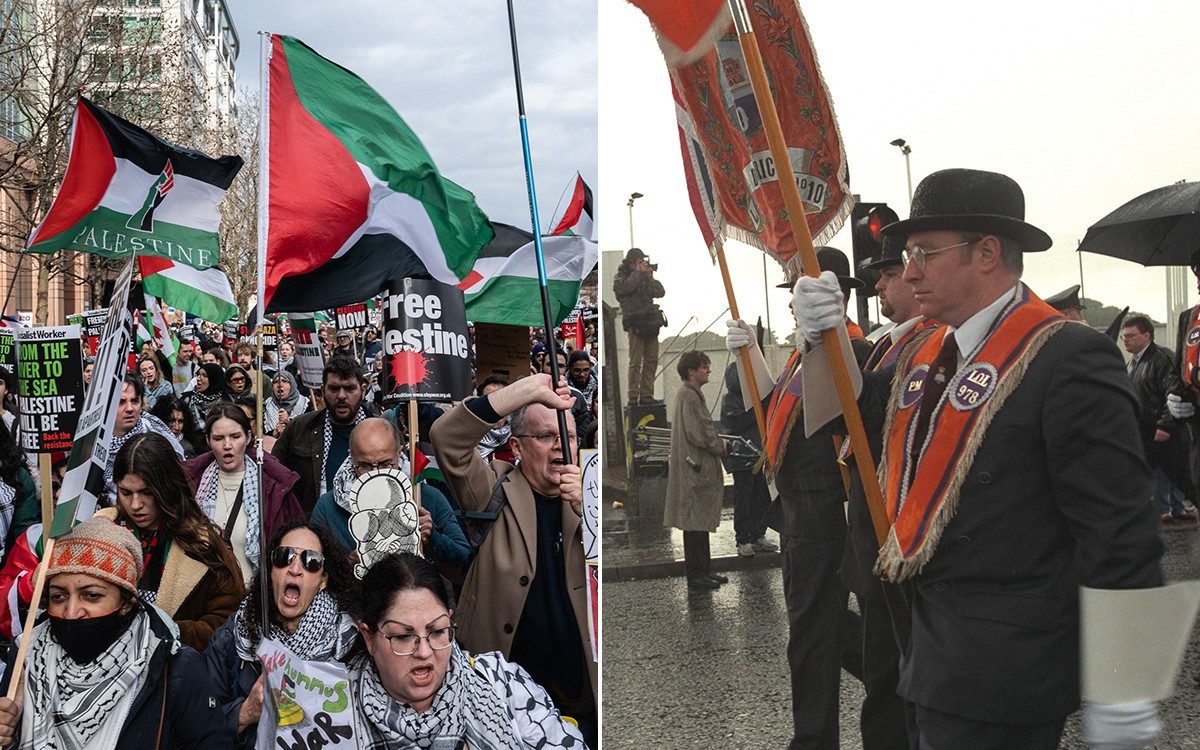
There are some similar themes emerging between London today and the Troubles – Guy Smallman/Getty Images | Sion Touhig/Sygma via Getty Images
Late morning on the second day of Passover in Stamford Hill, north-east London, the streets are busy with families on their way to synagogue. Women push double buggies – often with at least one too many children for the number of seats spilling out of them – men walk in groups and with purpose. It’s a sunny morning and this is a holy day and a happy day for this tight-knit community.
This year, though, there is also a tension in the air. The synagogues have extra security; the community is a little more cautious than usual. “We’re on guard,” says one mother – a 49-year-old orthodox Jewish woman. “Do I feel safe to let my children out alone? No, I don’t.”
A mother of eight (she asked not to be named), she says that previously she has never felt unsafe in London – something she doesn’t take for granted. “We always thank this country in our prayers,” she says. “We always thank the King. We are grateful to live in a place where we can be safe.” Since Hamas’s Oct 7 terror attack on Israel, some say a division has begun to be woven into the fabric of the capital.
Stamford Hill is home to the second highest concentration of Jews in the city – visibly so, with orthodox men and boys in particular marked out by their traditional dark clothing, black or fur hats and sidelocks.
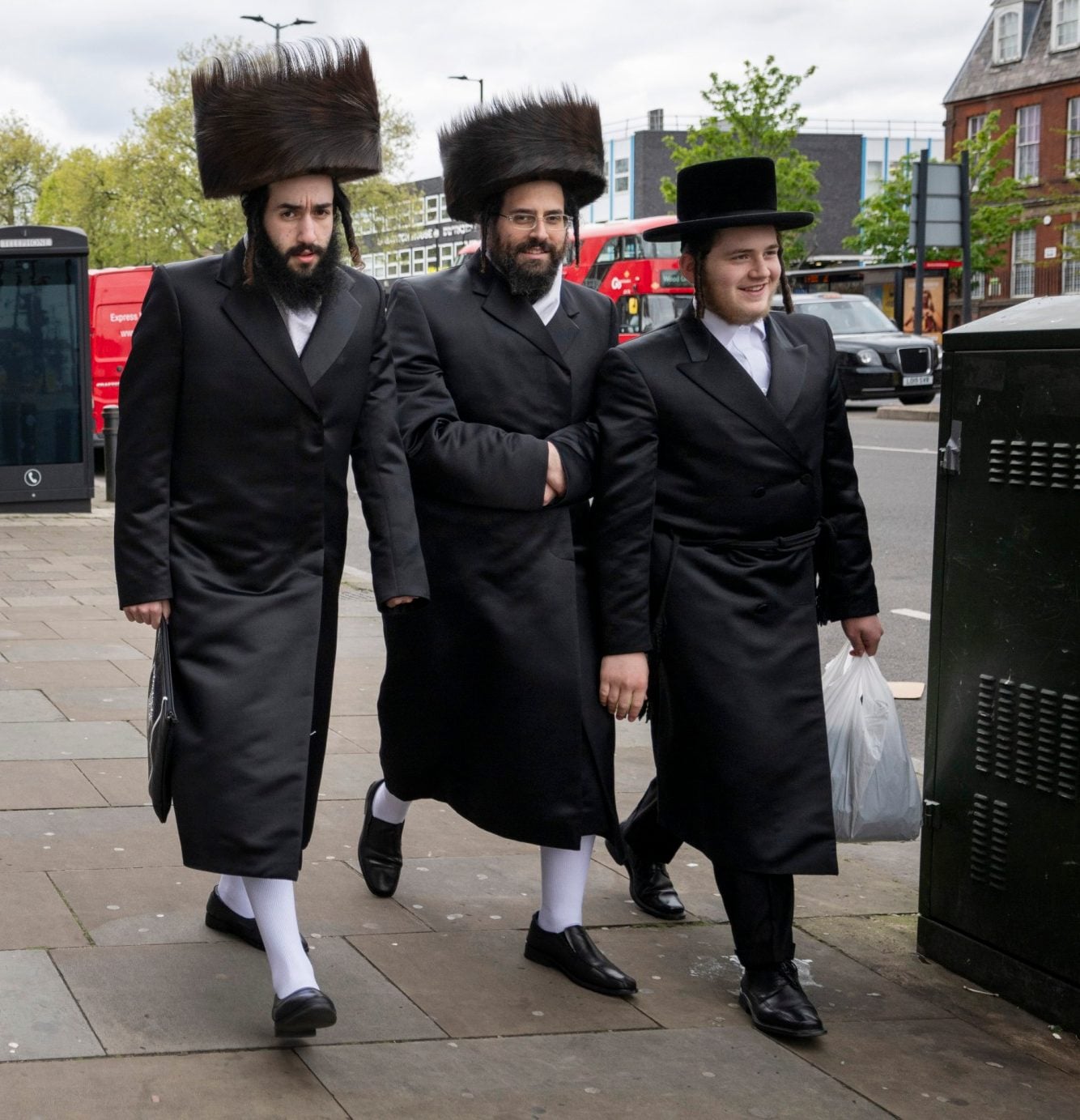
Orthodox Jews in traditional dress, seen in Stamford Hill – David Rose
But, in recent months, this mother has felt less and less comfortable going to areas where she is likely to feel more conspicuous. “I had to go for an appointment with one of my children recently at the Royal London Hospital. I’ve never felt unsafe there before and this time I felt eyes on me.
“My son is visibly Jewish. That’s what I worry about – the boys. It’s different for them. I worry about them going out on their own.”
While much of her daily life (and that of so many others in her community) is contained within the two square miles of Stamford Hill, she is keen to stress that it would be wrong to think that it would be normal for people here to rarely cross the boundaries of their neighbourhood. “The thing is yes we live here but we all have lives. We’re not here practising religion all day. I travel around London all day. I travel around the world, I travel around Europe for my business. I’ve never felt uncomfortable but always wary – definitely wary, looking over my shoulder.
“But people get on with their lives here. We are a resilient people.”
For many in the Jewish community in Britain – and, indeed, the Muslim community, both of which have experienced spikes in hate crime since Oct 7 – that wariness on the streets that she describes will be all too familiar. Many sense the edginess that has been bubbling up amid the continuing conflict. Some say that edginess is being stoked by the weekly pro-Palestine marches.
Last weekend, a video of Gideon Falter, the chief executive of the Campaign Against Antisemitism, on the fringes of a march in central London went viral. In the footage, an officer policing the march blocks Falter’s way, telling him: “You are quite openly Jewish, this is a pro-Palestinian march, I’m not accusing you of anything but I’m worried about the reaction to your presence.” Falter was told he would be arrested for “breach of peace” if he chose to stay alongside the march.
A longer version of the video has since shown police explaining to Falter he was being asked to move on because he appeared to be “looking to try to antagonise things”. Falter maintains he was victimised for being “in the vicinity” of a pro-Palestine march, and that the Met has questions to answer about the impact of these protests on Jewish Londoners.
“It has become intimidation,” he says, speaking two days after the video went viral. “Every single week now these marches are happening. They’re sending a very chilling message to the Jewish community, and I think that the time has come for them to stop.
“Something that is disturbing is that the Met has powers to stop these marches. The threshold is that the marches have to be causing serious disruption to the life of the community and they even changed the law last year at the Met’s behest so that the Met is allowed to take into account the cumulative effect of march after march.
“And they just won’t use the powers. So I look on that and I think these marches are becoming intimidatory and the Met is unwilling to use its powers to do anything about them and bring them under control.”
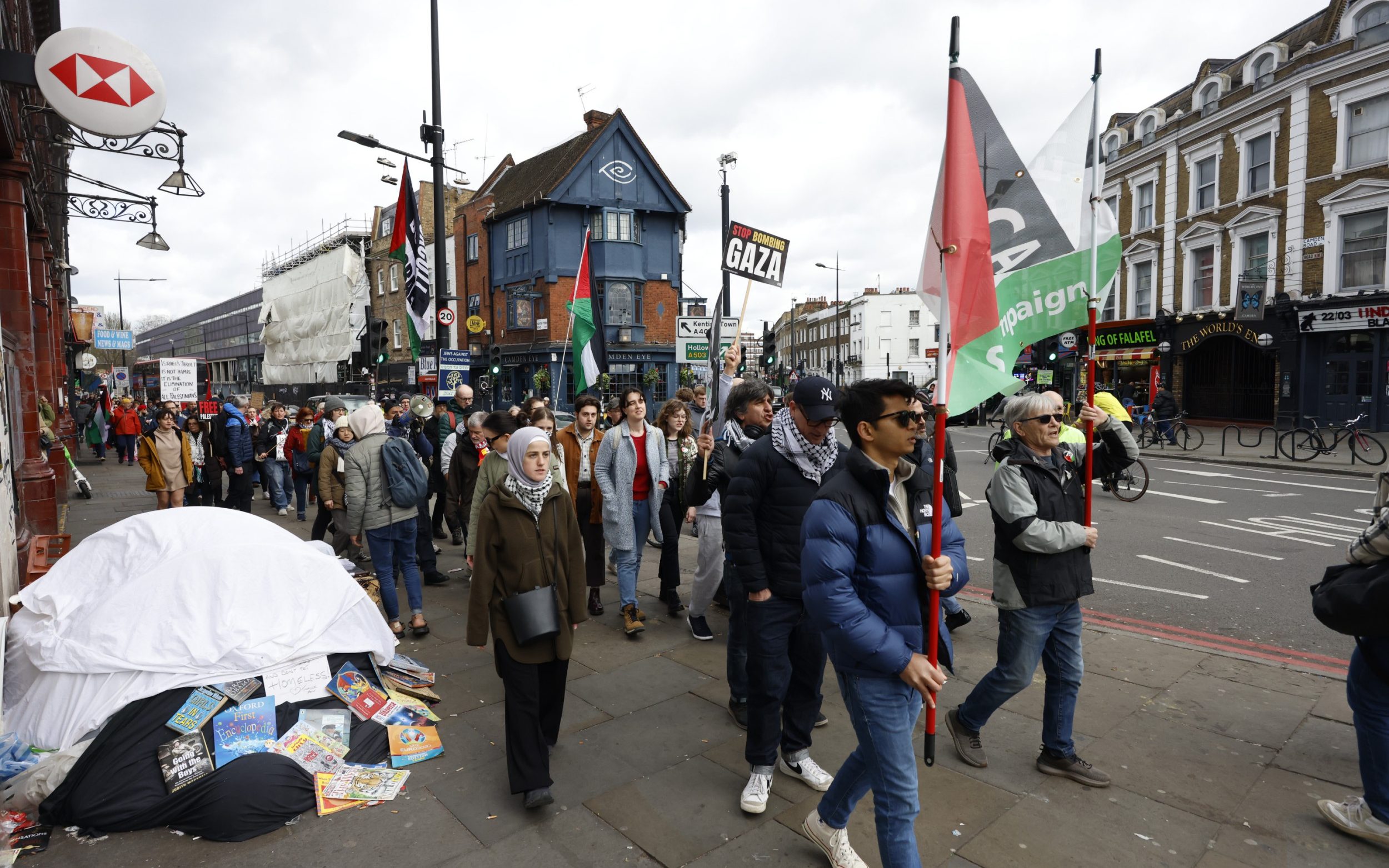
Pro-Palestine protesters march to the office of Labour leader Sir Keir Starmer in Mornington Crescent – Geoff Pugh
The Met told The Telegraph that Sir Mark Rowley, the Met Commissioner, met the president of the Board of Deputies of British Jews on Thursday and had “a constructive and positive conversation, with agreement to continue to work more closely with communities going forward”.
For some, deepening wells of fear, resentment or discomfort in communities that are living cheek by jowl shouldn’t just be seen as an inevitable consequence of a period of global conflict – it should serve as a warning sign, particularly to the police. Britain has a long history of multiculturalism, but it also has, just the other side of the Irish sea, an example of what it looks like when neighbourhoods are truly divided.
In Northern Ireland in the 1980s you were “victimised by indifference to your fears”, says Northern Irish academic Prof Peter Shirlow, director of the Institute of Irish Studies at the University of Liverpool and co-author of Belfast: Segregation, Violence and the City. “And of course that is, I can imagine, what is happening in the Jewish community. They are starting to feel that type of anxiety.”
Tens of thousands of people in Northern Ireland, he says, “would claim they were treated differently by the police because they were Catholic”.
The history underpinning geographical segregation in Belfast is, he’s keen to stress, not comparable with any feelings of division emerging in London, which has long been a city of blended communities. “In Ireland, 150 years of violence – people died. If two young lads have a fight at the bus stop, that’s two lads having a fight at the bus stop. If a Protestant lad hits a Catholic guy or vice versa, that becomes a community concern. ‘That victim represents my community – that’s what they do to us.’
“What you’re getting here with the Jewish community and the issues around Palestine is this self and other. That sociology of self and other is clearly starting to emerge.”
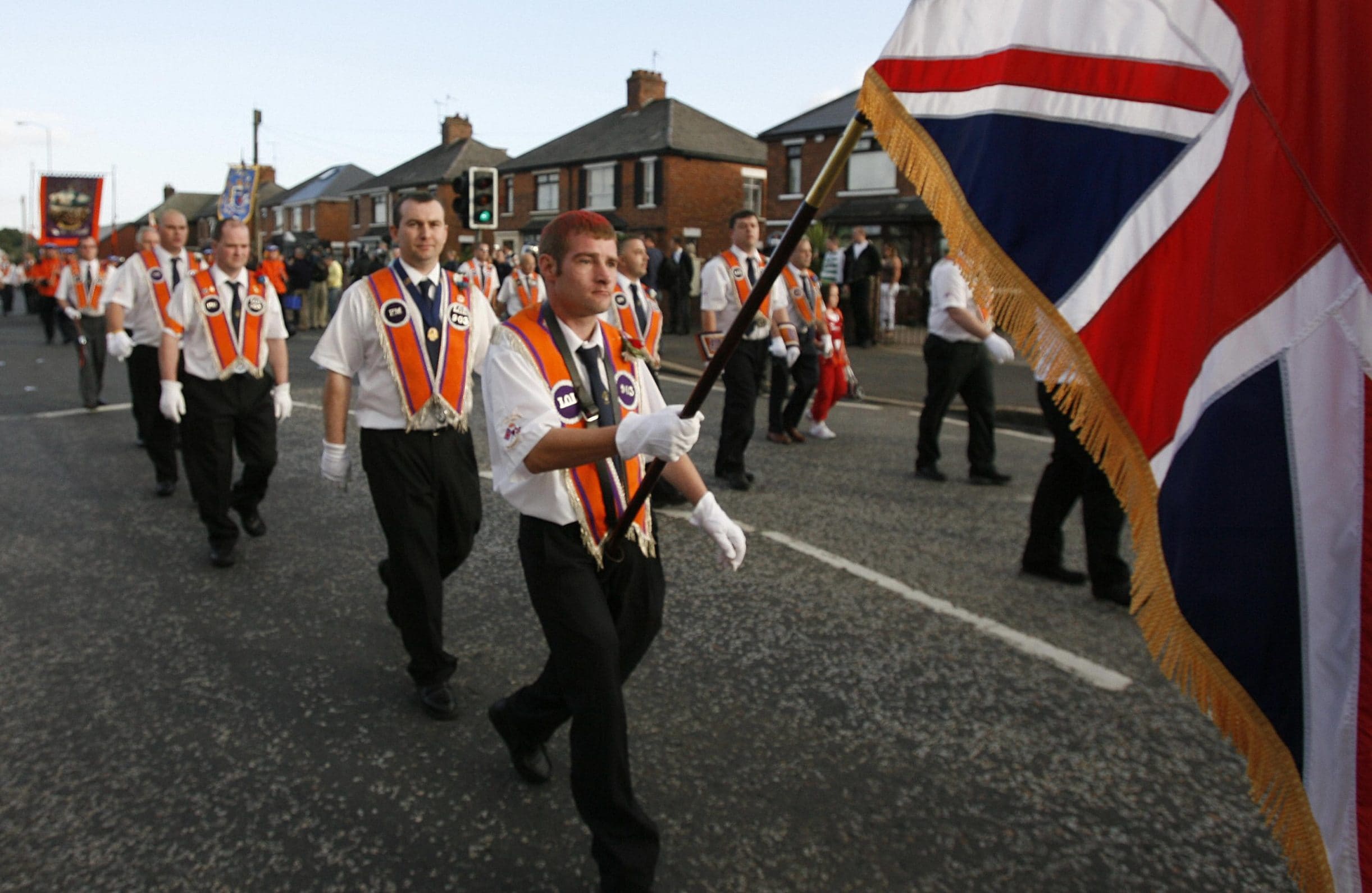
The Orange Order walks under heavy police protection in Belfast, 2006 – AFP
Many would say it’s the responsibility of the police to make sure that sense of “self and other” doesn’t take hold. Stephen Cargin, a former police chief superintendent in Northern Ireland, says the warning signs are already there, and it’s the Met that needs to step up. “I think the police need to be very careful,” he says. “When people are behaving in ways that they’re openly demonstrating hate speech, [behaviour] that’s potentially breaking the law, which a lot of this stuff is, I think the police need to be really careful.
“They have to steer a straight line. We either uphold the law in its entirety or we don’t, and once you’re seen to be saving one side of the community from the other, you start to lose the confidence of those communities. And I think that’s one of the lessons from Northern Ireland.”
Cargin was a district commander in Londonderry working on developing neighbourhood policing. In his experience, well resourced, trusted community policing is vital. “You have to earn trust with people, and I think the police at the moment are losing trust,” he says. “I watched the footage with the Jewish guy. That’s hugely damaging to policing, not just from a Jewish perspective but from any perspective.
“The police themselves need to decide: who are we? And actually how are we going to treat people? What are we going to allow?”
People will always, he says, “push and push and push”. If a community becomes too divided, it grows “impossible to enforce […] because you’ve given up the ground”.
“The law is there to protect people,” he says, “and the police have to enforce it, and in a fair way that’s fair to everybody.”
The police should be mindful, he says, of any signs of no-go areas developing. “The police should not allow any no-go areas in the UK – there shouldn’t be. And if you’re not careful you could fall back to the Northern Ireland scenario.”
When Cargin was a serving police officer in Northern Ireland, there were areas that were “much more difficult to police than other areas”.
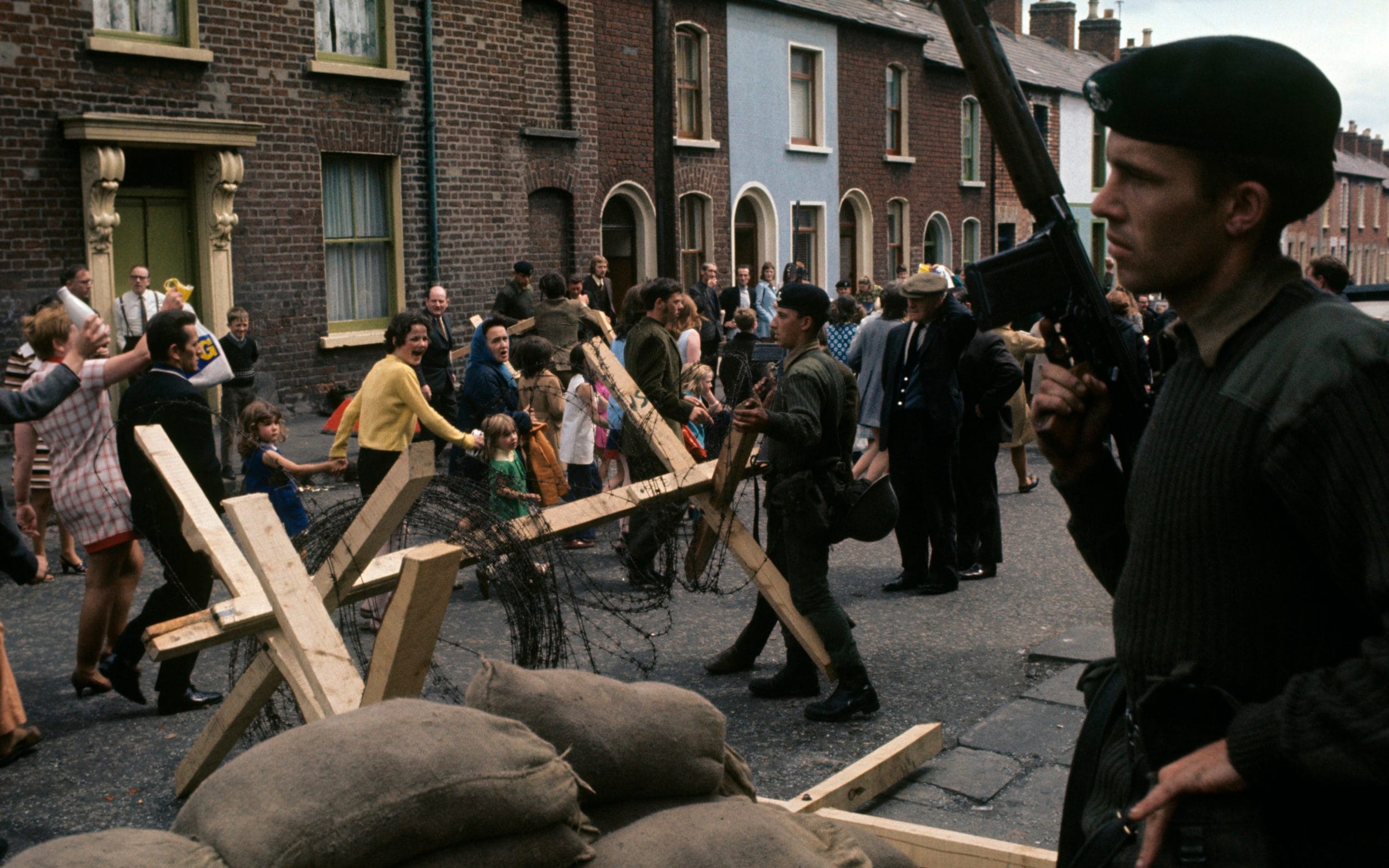
Catholic women demonstrate in Belfast, 1975 – Mondadori/Getty
“I think that’s why the police today need to really take a very serious look at themselves and ensure that there are no no-go areas, that we don’t allow that to happen, that we continue to police the areas that are a little bit more difficult and protect people and be the point of contact they want to go to because they know the police will keep them safe.”
A lack of policing can leave a “vacuum” that can then be filled. “We do not want to alienate communities,” he says. “If you create a vacuum other people will fill that vacuum with their own agenda.”
Policing marches is especially sensitive, says Cargin, speaking from experience. “I’ve policed a lot of marches over my career as a district commander and developed a lot of strategies around some very very contentious marches – some of the biggest marches in Northern Ireland. I think it comes down to working with communities, working with the organisers of marches, being very clear about what’s acceptable.”
He adds: “The police need to be very clear from the outset – what will they tolerate? What are the standards they expect march organisers to adhere to?”
In London in 2024, it would be wrong to suggest that certain communities are universally curtailing the way they move around their city, but many Jewish Londoners say it certainly feels different, and particularly on a march day.
Akiva Brunner, 35, an orthodox Jewish father of four who lives in Stamford Hill, says he won’t go near a protest. “As we look Jewish I wouldn’t go into those areas at all. I wouldn’t feel safe at all. And I don’t think it would be sensible to go there because people from the other side, people are obviously angry at this point. I don’t believe people on those sides understand the difference between a Jew and a Zionist. For them it’s a very grey line. So for me, for my safety, I will just stay away.”
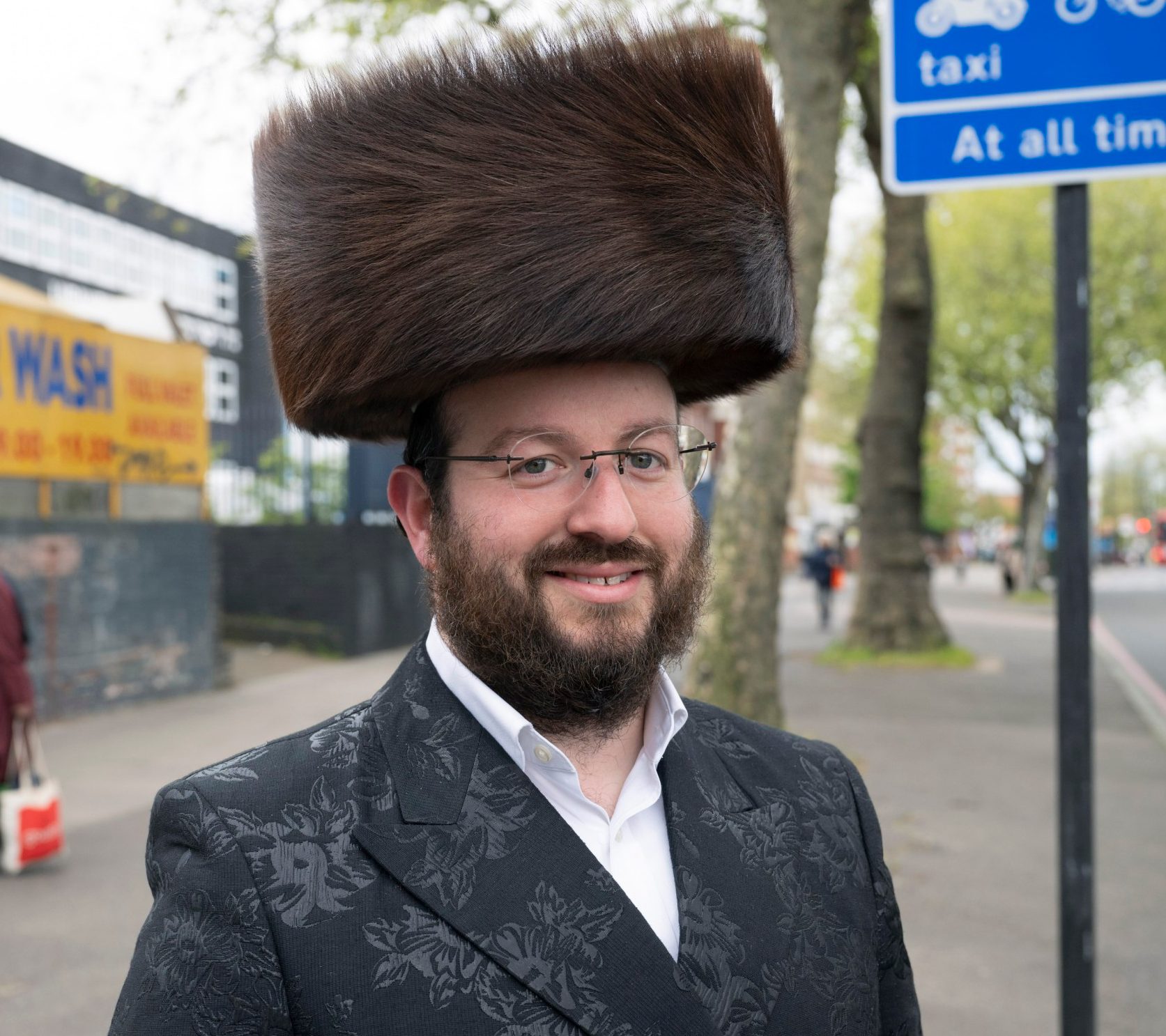
Akiva Brunner has said that he ‘wouldn’t feel safe’ near a pro-Palestine protest – David Rose
But Brunner doesn’t have to go too far from home to feel uneasy. “I’m in property management – when I go out of the area, in particular Leyton [east London], around the time when the school children go home, I do get shouted at.”
What do they shout? “It’ll be Jew or sometimes it’ll be Hitler or sometimes Free Palestine. […] It doesn’t make me comfortable. But I don’t hang around, I do my business and do what I need to do and move on.”
He has heard similar reports from others. “Everyone has their little [moments] especially when they go out of the area and meet people that don’t really understand the conflict. But we just try to stay away from those areas and go on with our daily life.”
Jews make up just two per cent of the population in Leyton, while Muslims make up 24 per cent. Jewish Londoners, who account for almost half of the 271,000-strong Jewish population in England and Wales, live in concentrated areas in the city. Nearly 60 per cent live in just 50 of the capital’s 1,002 neighbourhoods, with the highest concentration in Golders Green (where 53.1 per cent of the neighbourhood is Jewish), and the second highest in Stamford Hill.
The Muslim population of some 3.9 million nationally is more spread out, both in London and elsewhere in the country.
One of the areas with the highest numbers is Whitechapel, in the east London borough of Tower Hamlets, where 55 per cent of the population is Muslim. In February, Paul Scully, a Tory MP, was criticised for singling out Tower Hamlets as one of a number of pockets in Britain which, he said, were fast becoming “no-go” areas. He later apologised for his comments.
For Falter, there has been a shift in the way the Jewish community views the police. “Because of the threats against the Jewish community that have always been there throughout my lifetime, when you go to a synagogue or a Jewish community centre or a Jewish school, you are used to seeing police there. And when you do, you say two words to the police – you grow up saying thank you.”
Now, he says, as it begins to feel as if “there isn’t really anywhere that you’re immune to anti-Semitism”, that unquestioning thanks for the people whose job it is to keep the peace and protect is slipping. “Right at the beginning of this, even in the heart of Golders Green you had all sorts of graffiti appearing, all sorts of incidents taking place, and you realise there is nowhere that is a haven from anti-Semitism in the city.”
Somebody asked Falter recently if it was really the end of the world if Jews had to avoid the centre of London on Saturday. “I thought about it for a second. And I said yeah. It’s the end of the world that has existed since the Battle of Cable Street in 1936 when Jewish Londoners and their allies stood side by side and saw off the British Union of Fascists on their march which was protected by police. If we concede that we must now stay out of the centre of London during these weekends then we’ve conceded that entire life that we’ve had.” Today, just a stone’s throw from the mural marking that day 88 years ago, a Palestinian flag flies from the window of a block of flats.
In nearby Stamford Hill, as people spill out of the New Synagogue, one woman sums things up better than many could: “No one feels the same, but we try to celebrate holidays as far as we can and carry on our tradition. We just hope everything will go peacefully. Everyone deserves to live in peace, all over the world.”
Play The Telegraph’s brilliant range of Puzzles – and feel brighter every day. Train your brain and boost your mood with PlusWord, the Mini Crossword, the fearsome Killer Sudoku and even the classic Cryptic Crossword.
News Related-
Pedestrian in his 70s dies after being struck by a lorry in Co Laois
-
Vermont shooting updates: Burlington police reveal suspect’s eerie reaction to arrest
-
Grace Dent says her ‘heart is broken’ as she exits I’m A Celebrity early
-
Stromer’s ST3 Urban E-Bike Goes Fancy With Minimalist Design, Modern Tech
-
Under-pressure Justice Minister announces review of the use of force for gardaí
-
My appearance has changed because of ageing, says Jennifer Lawrence
-
Man allegedly stabbed in the head during row in Co Wexford direct provision centre
-
Children escape without injury after petrol bomb allegedly thrown at house in Cork City
-
Wexford gardai investigating assault as man is bitten in the face during Main Street altercation
-
Child minder’s husband handed eight year sentence for abusing two children
-
The full list of the best London restaurants, cafes and takeaways revealed at the Good Food Awards
-
Mazda CEO Says EVs 'Not Taking Off' In The U.S.—Except Teslas
-
Leitrim locals set up checkpoint to deter asylum seekers
-
Ask A Doctor: Can You Get Shingles More Than Once?
